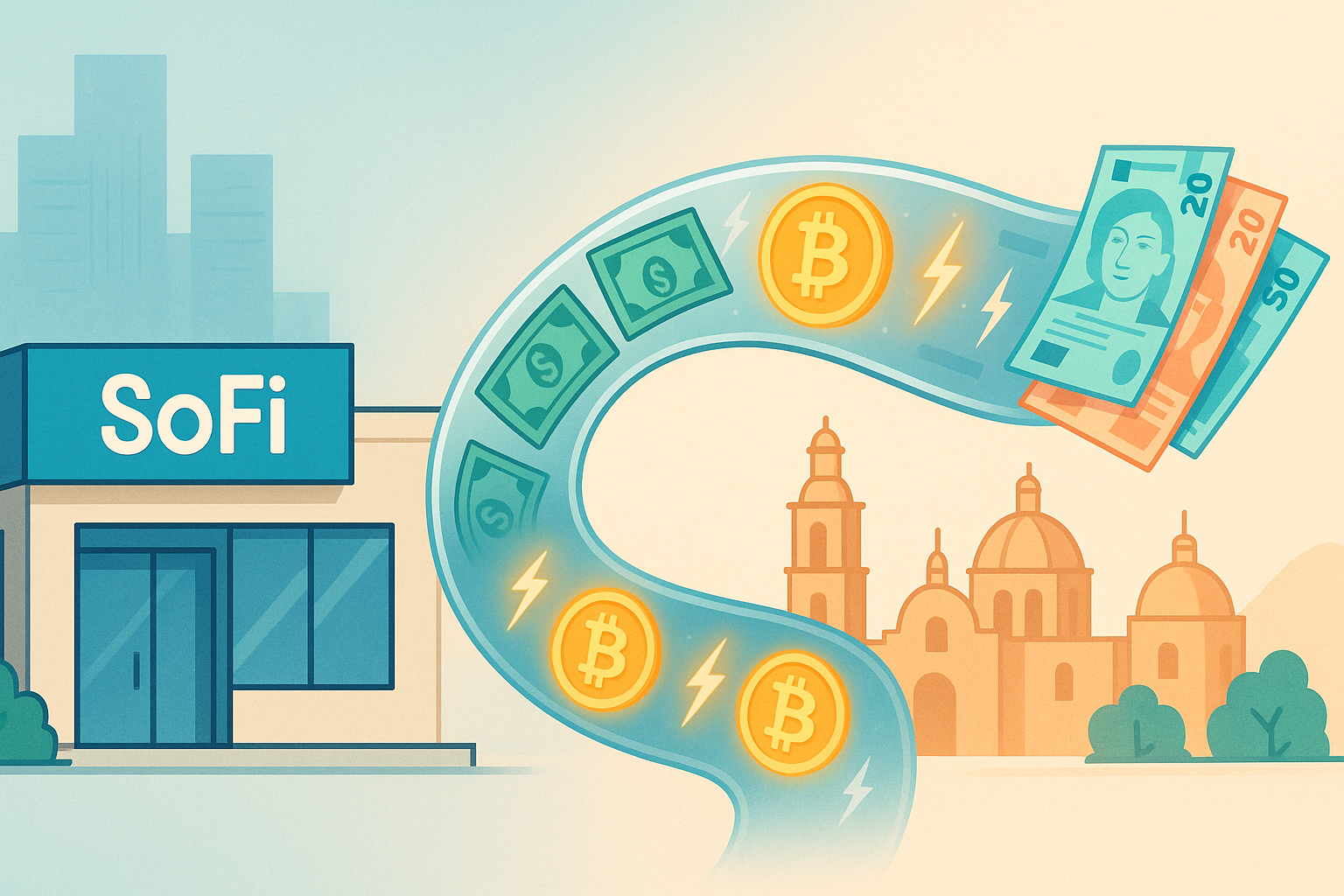In a move that's got Wall Street suits and crypto bros equally intrigued, SoFi has become the first American bank to actually deploy blockchain technology for something practical – sending money across borders. The digital-first financial company recently announced it's partnering with Lightspark to enable blockchain-powered international money transfers, starting with Mexico later this year.
Let's be clear about what's happening here. This isn't some theoretical blockchain use case or a bank dipping its institutional toe in crypto waters. It's much more interesting than that.
What SoFi is doing represents a genuine convergence point between traditional banking and cryptocurrency infrastructure – the dollars you deposit get temporarily converted to Bitcoin, zapped across borders via the Lightning Network (Bitcoin's solution for fast, cheap transactions), then converted back to pesos on the Mexican side. No waiting three days for settlement. No paying absurd fees. No restriction to "banking hours." Just... money moving at internet speed.
I've followed the remittance market for years, and the genius here is in the implementation.
SoFi isn't becoming a "crypto bank" (whatever that would mean). Instead, they're using blockchain as invisible plumbing – infrastructure that solves actual customer problems without customers needing to understand or interact with cryptocurrency directly. It's rather like how you don't care about the technical details of cellular networks when you make a phone call; you just want your mom to hear you.
This approach neatly sidesteps the regulatory nightmare that's consumed so many crypto ventures. By handling the Bitcoin conversion themselves and keeping customers firmly in familiar dollar territory, SoFi avoids the compliance headaches that come with customers directly handling crypto. The Bitcoin stage becomes merely transitory – a technological means to an end rather than the end itself.
Starting with Mexico? That's no accident.
Nearly $50 billion flows from the US to Mexico annually, often with fees ranging from 3-7%. That's a massive market with equally massive inefficiency – exactly the kind of setup that begs for technological disruption. Traditional remittance companies like Western Union have been extracting enormous profits from this corridor for decades, essentially taxing the financial lifelines that connect immigrant workers to their families back home.
(Full disclosure: I've used these services myself when traveling, and the fees always felt like highway robbery.)
SoFi's evolution has been fascinating to watch. What began as a student loan refinancing startup has methodically expanded into a comprehensive financial services provider that eventually secured a full bank charter. Their consistent strategy has been what you might call "financial ecosystem building" – creating a single digital destination for every money-related need a consumer might have.
This remittance play follows that same playbook. If you're already banking with SoFi, why would you bother with a separate service to send money internationally when you can do it cheaper, faster, and without switching apps? And if you regularly send money to family in Mexico, why wouldn't you consider moving your primary banking to the provider that handles this crucial need most efficiently?
Of course, SoFi won't have this lane to themselves for long. The model is replicable – dare I say copyable? – and if it proves successful (which early indicators suggest it will), expect to see other digital banks and eventually even traditional institutions follow suit. First-mover advantage only matters if you can convert it into lasting customer relationships.
The implications here go well beyond just remittances, though.
What we're witnessing is blockchain technology's quiet integration into mainstream financial services – not as a get-rich-quick scheme or libertarian fantasy, but as practical infrastructure solving actual problems. After years of solutions desperately searching for problems, the technology is finally finding its right-sized applications.
Look, for all the revolutionary rhetoric about how blockchain would upend banking overnight, its first major mainstream application turns out to be... making an existing service better. There's a profound lesson there about how technologies actually transform industries – not through dramatic disruption, but through the unglamorous work of fixing specific pain points that customers genuinely care about.
Will this move define SoFi's future? Hard to say. Execution matters enormously here. But when financial historians eventually chronicle how blockchain technology was domesticated by the banking system, this moment will deserve at least a paragraph or two.
In the meantime, millions of people sending money to loved ones in Mexico might just get to keep a bit more of their hard-earned cash. And they'll probably never know – or care – that Bitcoin made it possible.
